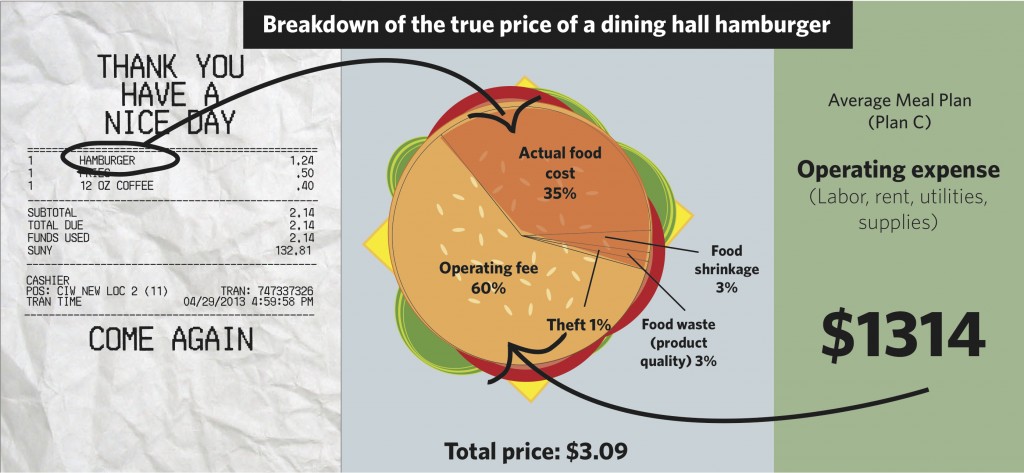Following Pipe Dream’s editorial calling for more transparency and suggesting that some dining hall prices may be too high, the Residence Dining Advisory Committee determined that burritos — and everything else sold by Sodexo — are fairly priced.
The committee, comprising students, faculty, University staff and Sodexo employees, published a report last month following an extensive review of Sodexo prices which concluded that students were not being overcharged in the dining hall.
“As a committee, we found that the numbers were reasonable,” said James Grippe, a member of the committee and a junior majoring in computer science. “I feel like Sodexo is well within their pricing guidelines that they’re advertising to everybody.”
In the case of the burrito, the committee concluded that the inflated prices compared to retailers such as Chipotle stemmed from the fact that Sodexo charges for burritos by weight rather than portion. For example, the report says that a retailer may include 3 oz. of meat in a standardized burrito, but Sodexo does not impose any such restrictions. Thus, the report says, burrito prices must be calculated on a made-to-order model rather than the portioned model used by other vendors.
The report also said that Sodexo includes sour cream and guacamole in the cost of the burrito, while most vendors charge extra.
In response to concerns about burrito prices, Sodexo tried implementing the option for a portioned burrito, with pre-set ingredient amounts, to lower the price at the register, but the report says the portioned burritos were poorly received, accounting for a near-negligible number of total burrito sales.
The report also gave a breakdown of how the price charged at the register is broken down by percentage: the actual food cost accounts for approximately 87.5 percentage of the price charge at the register; food shrinkage accounts for approximately 6.5 percent of loss during preparation; food waste, where food that goes unsold is thrown out to preserve freshness, accounts for 3 percent; and theft accounts for the remaining 3 percent — all of which fall within the range of industry standards.
Sodexo granted the committee access to Sodexo’s invoices for ingredients and drink costs to allow them to conduct their review. The invoices are usually kept private, according to James Van Voorst, the BU vice president for administration, to avoid putting Sodexo at a competitive disadvantage. He said that if competitors knew the prices charged to Sodexo by employers, they could use it to undercut Sodexo’s proposal in the upcoming contract negotiations.
Although the committee did not make any specific pricing recommendations, they agreed to review Sodexo’s prices more frequently going forward and to better publicize their findings to increase transparency.
“I think the report is good; it made some good recommendations too about going forward and being a little bit more transparent about who’s doing what,” Van Voorst said. “We will do these things.”
Grippe called the review an overall “positive experience,” and said it benefits student leaders by helping them understand how Sodexo functions.
“It gives a more transparent outline to what’s going on,” he said. “Any time you can have transparency with the administration and the companies it works with that’s a good thing.”
Editor’s note: Editor-in-Chief Daniel S. Weintraub recused himself from this story.



